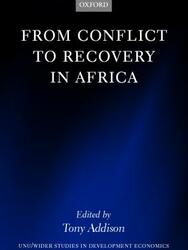The present hot topics of security discourse have tended to shift attention away from Africa: a big mistake. This continent has been fated to play the role of proving-ground both for conflict's cruelest variants and for the most forward-looking solutions. It strongly illustrates the interweaving of various dimensions of human security, so vital for finding the answers to new threats like mass-impact terrorism. Tony Addison's edited volume focuses on the economic damage invariably done by conflict and the policy challenge of how to repair it, concluding that only an early and sustained effort to address structural reforms can do the trick.' - Alyson J.K. Bailes, Director - SIPRI
'This very timely book should be widely welcomed by social scientists and policy practitioners with an interest in development in post-conflict societies, especially in Africa ... Addison pulls together a clear set of policy recommendations that resonate well beyond the handful of countries on which this intensively researched collection was based.' - Professor Peter Burnell, University of Warwick
'It is sad that a book such as this must be written, but conflict is a tragic fact of life in the sub-Saharan region. This book brings hope for the future, through its sound, professional research. Again, WIDER demonstrates that it is on the 'cutting edge' of development economics.' - John Weeks, Director Centre for Development Policy and Research
'I am confident that this book will serve as an excellent handbook for all those engaged in matters relating to poverty reduction, disarmament, demobilization and reintegration of combatants in Africa.' - James O.C. Jonah - Former United Nation's Under-Secretary-General for Political Affairs and former Minister of Finance of Sierra Leone
'From Conflict to Recovery in Africa is an admirable work. In a painstaking and succinct manner the contributors have satisfactorily examined the whole array of difficult factors and variables that must be tackled if a broad-based recovery from conflict can be achieved ... In my capacity as Minister of Finance, Development and Economic Planning and later as Minister of Finance (1998-2001) in Sierra Leone I was in charge of efforts to manage the country's ruined economy to post conflict development. My regret is that this book was not available at that time, as the case studies would have provided many lessons for countries like Sierra Leone.' - James O.C. Jonah - Former United Nation's Under-Secretary-General for Political Affairs and former Minister of Finance of Sierra Leone
'This is a well researched study that combines solid theoretical analysis with a deep understanding of the complex empirical realities of post-conflict reconstruction and development in Africa ... It sends a powerful message to the international community that it has an obligation to assist African countries to achieve durable peace.' - Nitin Desai, Under-Secretary-General United Nations Department for Economic and Social Affairs
'From Conflict to Recovery in Africa is a tour de force, analyzing nation-states in Africa that confront multiple tasks of reconstruction from war, transition from socialism to liberalism, and attaining economic growth and poverty reduction. Readers will benefit from the insights of Tony Addison and contributors to our understanding of the economic development and transformation of Angola, Eritrea, Ethiopia, Guinea-Bissau, and Mozambique.' - E. Wayne Nafziger, University Distinguished Professor, Kansas State University
'From Conflict to Recovery in Africa provides a comprehensive analysis of the challenge of reconstruction in the world's poorest continent. Based on case studies undertaken in five Sub-Saharan states, the volume focuses largely on the role of national actors in the recovery process, a perspective which enables the authors to make a particularly original contribution to our understanding of contemporary Africa.' - Dr Jeff Crisp, Head, Evaluation and Policy Analysis Unit, UNHCR
'The authors make a persuasive case that peacebuilding, economic reform, and democratization can and must go together in Africa. This book is essential reading for all concerned with the transition from war to peace.' - James K. Boyce, Director, Program on Development, Peacebuilding, and the Environment, Political Economy Research Institute, and Professor, Department of Economics, University of Massachusetts, Amherst
'From Conflict to Recovery in Africa is an outstanding contribution to the literature on conflict prevention and peace building ... While the book is based on excellent case studies of Angola, Mozambique, Guinea-Bissau, Ethiopia and Eritrea, its conclusions are widely applicable, even to conflict situations and crisis states outside of Africa. I highly recommend it to all those who are interested in the relationship between conflict prevention, peace building and long-term development, for which democratic governance is one of the most effective means of institutional capacity building for sustainable livelihoods and the eradication of poverty.' - Georges Nzongola-Ntalaja, Director, UNDP Oslo Governance Centre, Oslo
 Join the network
Join the network